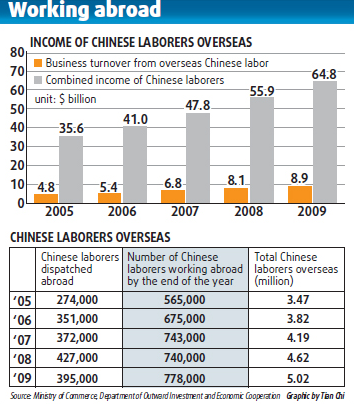Laborers vulnerable to rogue job agencies
 Last December, 52 of the farmers lodged a joint lawsuit against the job agency and are demanding compensation of more than 5.5 million yuan. The entire group has also appealed for help from the provincial government in Shijiazhuang, capital of Hebei.
Last December, 52 of the farmers lodged a joint lawsuit against the job agency and are demanding compensation of more than 5.5 million yuan. The entire group has also appealed for help from the provincial government in Shijiazhuang, capital of Hebei.
Zhu Yu and his brother now save every penny they make as waiters in Dezhou, a city in neighboring Shandong province.
"Those bricks piled in the yard, I bought them for repairing the house with the money my sons were expected to bring back," said Zhu Zhenfang as he stood in his home, which he cannot even afford to heat this winter. "Our dreams have been destroyed. The money we make toiling in the cotton and corn fields is just enough to feed my family, so how can we hope to repay these debts?"
The number of Chinese workers taking jobs abroad increases by about 11 percent every year, with more than 850,000 overseas as of last October, a record high, according to Ministry of Commerce figures. These laborers generate a combined average annual income of US$4 billion, which benefits about four million families directly, said ministry officials.
As more Chinese look to opportunities in other countries, the central government has attempted to enhance laws against rogue job agencies. Yet legal professionals said fraud is still a major risk.
For rural laborers, who are often poorly educated, it can be hard to distinguish sophisticated criminal operations from legitimate ones, said experts.
The intermediate agency, Gucheng Shunda Labor Information Consultation Co Ltd affiliated to China International Enterprises Economic and Trade Co Ltd, recruited the workers in the name of constructing a big supermarket in Romania, said Ping Hongmin, the attorney representing the 52 laborers for Beijing Boru Law Firm.
The group was even given formal interviews and was met by a man claiming to be an Israeli property developer, who later turned out to be a local Romanian, he said.
The farmers all borrowed money from friends and family to pay the 80,000-yuan fee. However, any receipts they were given by the agency had to be handed back at the airport in exchange for their visas and tickets. "We had no choice," said Li Baoxu.
Except a few copies of receipts made by cautious workers, the group does not have a single contract of employment, added lawyer Ping.
 0
0 






